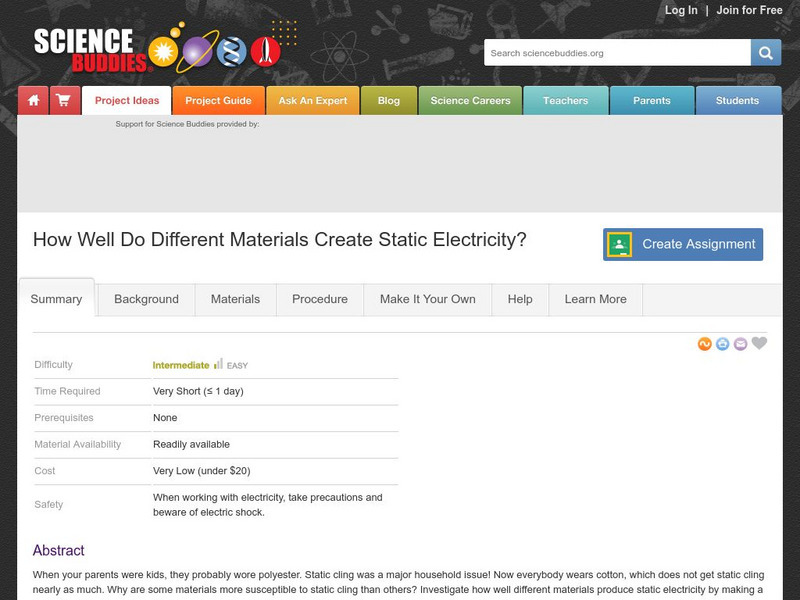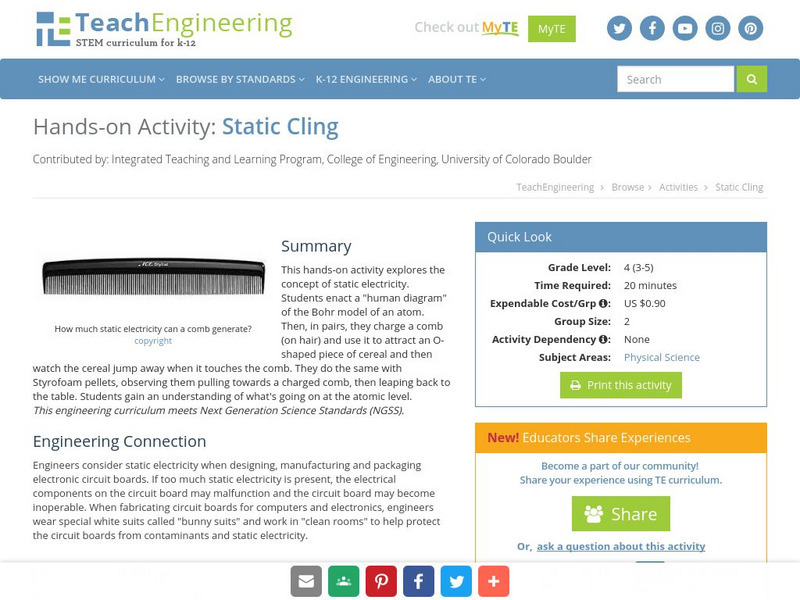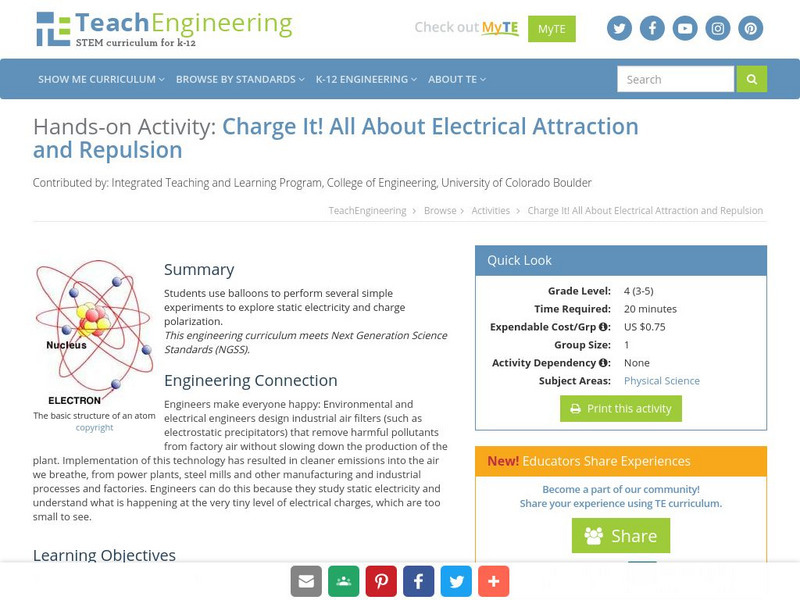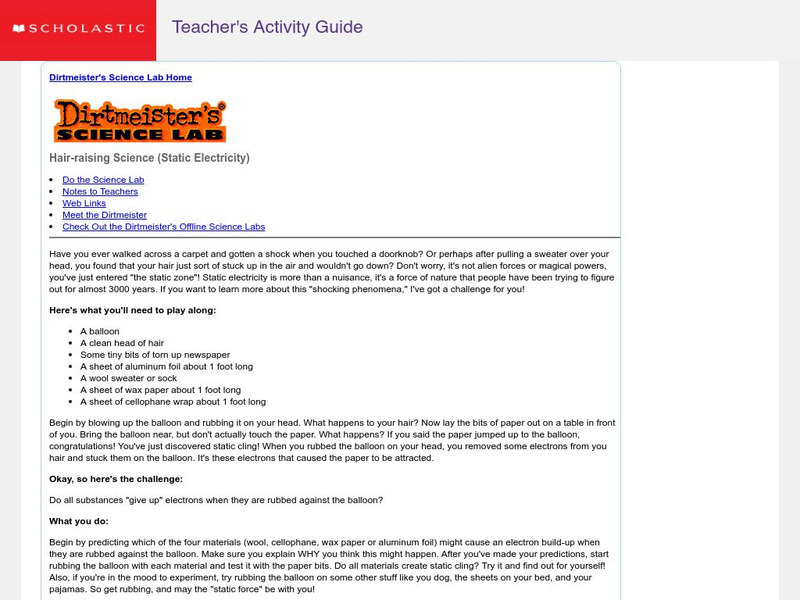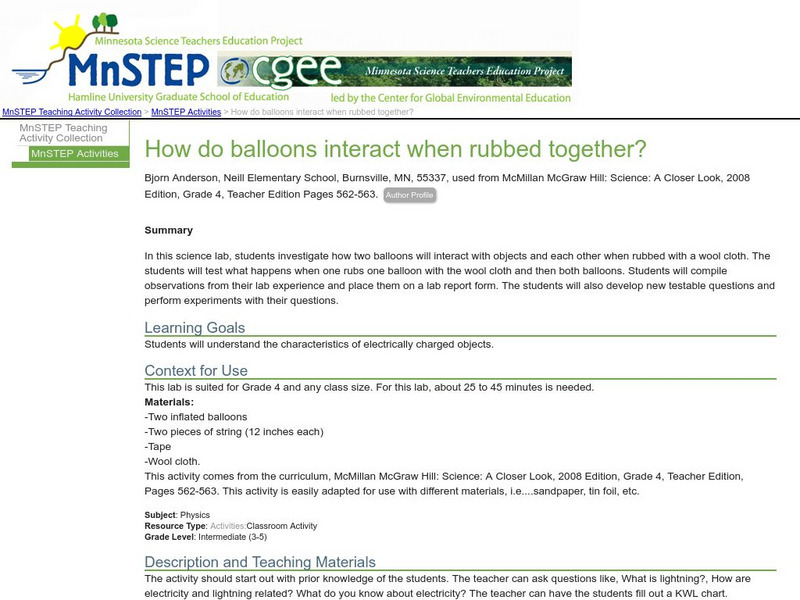Science Buddies
Science Buddies: How Do Different Materials React to Static Electricity?
Polyester clothing was generally accepted as a popular trend in fashion at one point in history. Now everybody wears cotton, which doesn't get static cling nearly as much. Why are some materials more susceptible to static cling than...
Science Education Resource Center at Carleton College
Serc: Investigating Static Electricity: Creating Lightning on Much Smaller Scale
In this elementary science activity, students will experiment with static electricity using balloons. After investigating how balloons attract and repel various objects, students will watch a simulation of static electricity to help gain...
University of Colorado
University of Colorado: Ph Et Interactive Simulations: Balloons and Static Electricity
An interactive simulation with balloons and a sweater that teaches about static electricity, electric charges, and electric force. This simulation can either be downloaded or played online and includes handouts, lesson plans, and...
University of Kentucky
Elecroscope Lab
This site is actually a lab from the University of Kentucky Electrical Engineering Department. It is an excellent experiment that can be done at the high school level.
University of Colorado
University of Colorado: Ph Et Interactive Simulations: Balloons and Static Electricity
Investigate static electricity by rubbing a balloon on a sweater and observing what happens. Try it with two balloons. See the positive and negative charges that illustrate why there is attraction or repulsion between the balloons, the...
TeachEngineering
Teach Engineering: Static Cling
This hands-on activity explores the concept of static electricity. Students attract an O-shaped piece of cereal to a charged comb and watch the cereal jump away when it touches the comb. Students also observe Styrofoam pellets pulling...
TeachEngineering
Teach Engineering: Charge It!
Students use a balloon to perform several simple experiments to explore static electricity and charge polarization.
Exploratorium
Exploratorium: Science Snacks: Physics/electricity & Magnetism
Exploratorium Science Snacks are miniature science exhibits and experiments that can be made with common, inexpensive, easily available materials. These electricity snacks represent a set of devices that you can build and experiment with...
Georgia Department of Education
Ga Virtual Learning: Electrostatics
Through informational text, interactive activities, practice problems, and virtual simulations, students learn about the basic properties of electricity in this unit.
Utah State Office of Education
Utah Science: The Mysterious Force
There is a secret mysterious force in your home right this very moment! Try these activities to first identify that force and then extend your knowledge of the force by investigating the other activities provided.
Physics Classroom
The Physics Classroom: Static Electricity: Newton's Laws and Electrical Force
How do Newton's Laws connect with electrical forces? This overview illustrates how they blend together. After studying this explanation, test understanding with the review questions provided.
PBS
Pbs Learning Media: Testing for Static Electricity
In this video segment adapted from ZOOM, cast members show you how to make your very own electroscope. You can use it to find out if an object is electrically charged. [4:17]
MadSci Network
Msn: Why Do Some People Have Problems With Static ?
From the The Mad Scientist Network website, this page uses a question and answer format to discuss the concept of electrostatic induction. The cause of the common occurrence of an electric shock is explained.
Energy for Sustainable Development
Esd Bulgaria: Kids & Energy: Electricity
Electricity is the flow of electrical power or charge. It is a secondary energy source which means that we get it from the conversion of other sources of energy, like coal, natural gas, oil, nuclear power and other natural sources, which...
Scholastic
Scholastic: Dirtmeister's Science Lab: Hair Raising Science
A great experiment to show students how electrons move by static electricity. This site includes web links, a challenge question, and notes for the teacher.
TED Talks
Ted: Ted Ed: The Science of Static Electricity
We've all had the experience: you're walking across a soft carpet, you reach for the doorknob and ZAP. But what causes this trademark jolt of static electricity? Anuradha Bhagwatsheds light on the phenomenon by examining the nature of...
Science Education Resource Center at Carleton College
Serc: How Do Balloons Interact When Rubbed Together?
Students investigate how two balloons interact with objects and each other when rubbed with a wool cloth. The students will also develop new testable questions and perform experiments to further their learning.
University of Colorado
University of Colorado: Ph Et Interactive Simulations: John Travoltage
Make sparks fly with John Travoltage. Explore how charging Johnnie up and moving his hand changes how he gets shocked!
PBS
Nova Teachers: Lightning: Classroom Activity
This lesson plan allows young scholars can create static electricity and compare it to lightning.
Michigan State University
Michigan State University: Physics: Coulomb's Law
Here is a presentation of Coulomb's Law and the electric field potential formula, with example problems.
Science is Fun
Fun Science: Bending Water
Find out how you can bend water with the help of static electricity. All you'll need is a faucet and a comb.
Other
Kidstorm: Lightning
Learn about lightning formation and lightning safety with this detailed webpage.
National High Magnetic Field Laboratory
Magnet Academy: Sulfur Globe 1660
In the 17th century, German scientist Otto von Guericke built and carried out experiments with a sulfur globe that produced static electricity.
National High Magnetic Field Laboratory
Magnet Academy: Wimshurst Machine 1880
In the modern world, virtually everyone is familiar with electricity as an accessible, essential form of energy. In electricity's earlier days, scientists used the buildup and release of static electricity.
